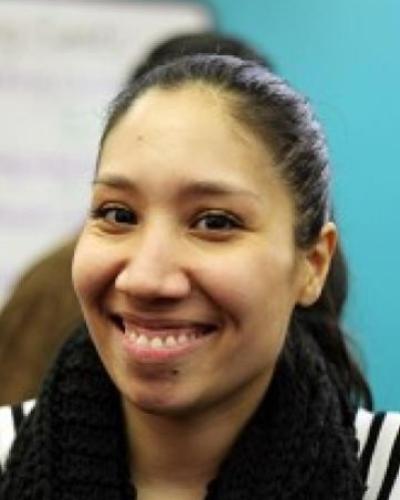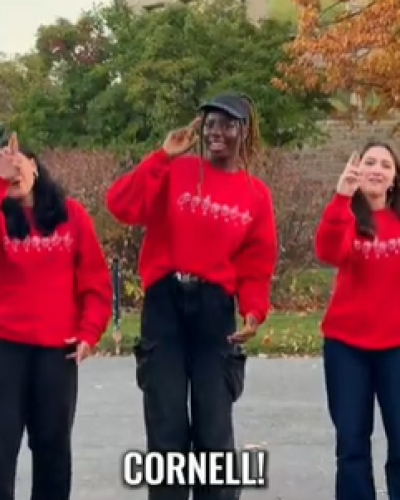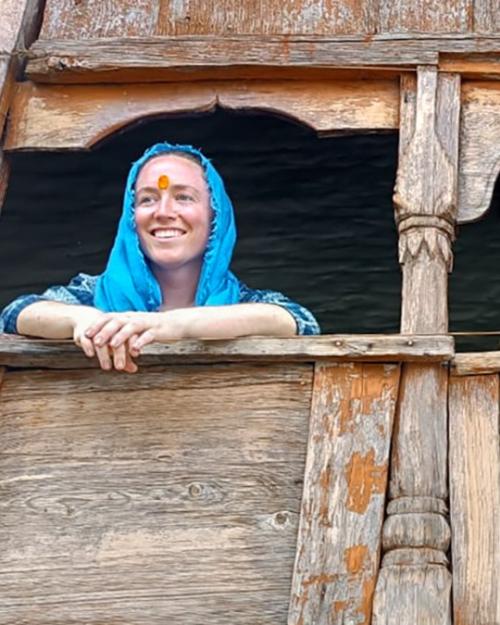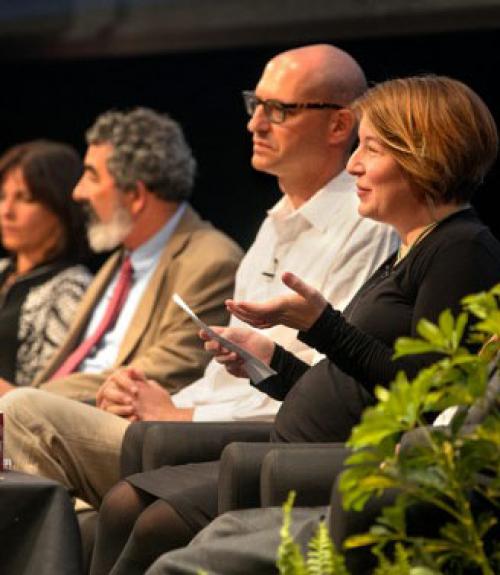“How do we reconcile stable truth with multiple understandings of truth?” Bruce Lewenstein, professor of science communication, posed that question during an academic symposium, “Universities and the Search for Truth,” held Aug. 24 in Bailey Hall. The event was part of the celebration of Martha E. Pollack’s inauguration as Cornell’s 14th president.
Faculty members from a range of disciplines – law, linguistics, information science, medicine, molecular biology and genetics, and English – spoke on the role of truth in their fields and in society.
Lewenstein, who moderated, said Pollack chose the topic because it is both “universal and … incredibly timely.” It’s universal, he said, because “finding ways to identify and defend reliable knowledge” and making it available for others have been primary functions of universities throughout their history.
And it’s timely, given current affairs and global politics, as “we live in a time when … debates are central to the way we live in the world” and have real consequences for and real impacts on people’s lives, he said.
Themes addressed included: how truth serves different functions based on the situation; social aspects of truth and how it is tied to culture and language; the role of trust in the search for truth; and actions needed to preserve truth in universities and in society.
“One of the important things in science is a clear distinction between facts and opinions,” and “lying – falsifying data – is one of the biggest sins” for scientists and can destroy careers, said David Shalloway, the Greater Philadelphia Professor in the Department of Molecular Biology and Genetics.
Lyrae Van Clief-Stefanon, associate professor of English, said that “living in a nation that is founded on the idea that my identity, that I can’t exist … a black woman poet. There’s no such thing as that, that cannot be possible, according to Thomas Jefferson, the same author of ‘we hold these truths to be self-evident.’ And so it changes your relationship to how truth and things like that work, when you walk through worlds that are so unreal.”"So, within linguistics, we assume – we make a simple assumption that sentences have truth values. Sentences are true or false," said associate professor Sarah Murray." For example, I’m sitting down, that’s true. I’m standing up, that’s false. And so, there you go. That’s it, we’re done. But it turns out not all cases are so clear-cut. For example, how about the sentence, Ithaca winters are not cold. Is that true? Is it false? Is there an objective fact of the matter about whether the sentence has a truth value? Does it rely on standards of coldness that might vary depending on each person? Can we capture this in a theory of meaning? So, there are these issues, lots of kinds of cases that push this, what seems to be a clear-cut notion."
She recounted getting an MRI, and when she received the results, the form noted, “likely due to the patient’s wig,” in reference to her long hair.
“This is the hair that grows out of my head,” she said, “but the world that I live in distorts facts and truths into these other things.”
“Science and medicine are compromised the further they stray from pure, 100 percent, unadulterated truth,” said Holly Prigerson, the Irving Sherwood Wright Professor in Geriatrics and professor of sociology in medicine at Weill Cornell Medicine. “Yet, currently much of medical information that exists today is likely based more on half-truths than on whole truths.”
Pharmaceutical companies often hype drugs and exaggerate claims to a drug’s effectiveness, she said, and terms such as “palliative chemotherapy,” treatments given to dying patients supposedly to soothe the symptoms of terminally ill cancer patients, are by nature false. Studies show that such treatment actually “increases the risk that a patient will spend the last few days in a hospital with a lot of adverse events,” she said.
Kevin Clermont, the Robert D. Ziff Professor of Law, discussed two big differences found in law, compared with the search for pure knowledge in a university setting. One is that “truth is admittedly not the only goal of law,” that justice also is an objective. Also, “law cannot leave decision for another day,” as might be the case for research, which might require further evidence to arrive at certainty. Lawmakers must come to decision “in a world of uncertainty and imperfect evidence,” he said.
Mor Naaman, associate professor of information science at Cornell Tech, claimed that, from his perspective, “modern media technology is killing truth and knowledge.” Instead, such technology emphasizes only “information and emotion.” Our information ecosystem – most notably social media – is a “well-tuned and optimized machine that plays exactly to these tendencies, supporting information and the emotions it triggers over what we may refer to as knowledge or truth.”
While cells of alternate realities have always been there, often created in the past by charismatic leaders, today “believers or even skeptics can find, online, a wide array of ‘alternative facts’ to support any belief or viewpoint,” he said.
Naaman talked about “persuasion chambers,” saying, “ … our online spaces are optimized to strengthen a belief we already have and ignore or reject ideas that we do not agree with.”
To address these issues, Naaman said, universities need to educate students in technology and related fields “so they understand the ethical, philosophical and social issues as well as the technical”; educate all students about how technology enhances and creates misinformation and biases; create curricula that can “enhance the voices of those that participate in fact-based discussion” from the left and right; and focus research on big topics, such as trust and attention, that play a critical role in issues surrounding truth.
This article first appeared in the Cornell Chronicle.





